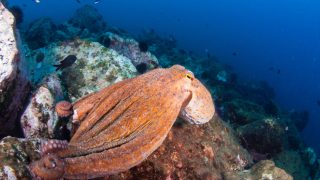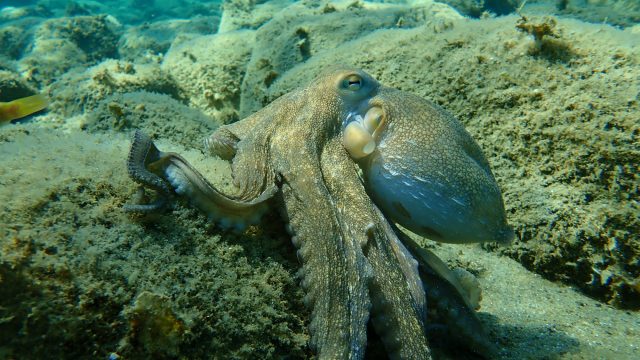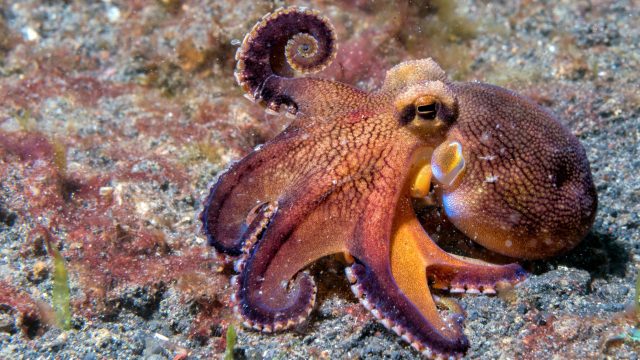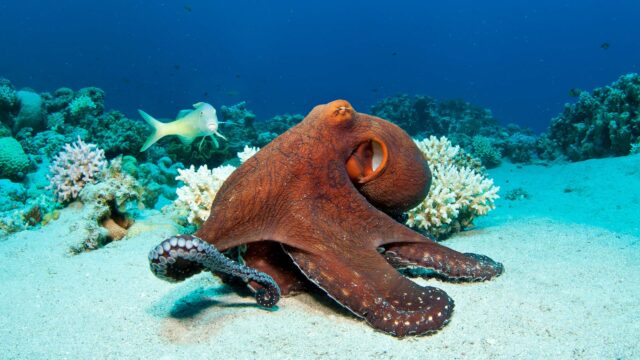
OCTOPUS Act Reintroduced in the U.S. Senate
The federal bill would prevent the industry from gaining traction by banning commercial octopus farming in the U.S.
Contact: media@aldf.org
WASHINGTON — The Opposing the Cultivation and Trade of Octopus Produced through Unethical Strategies (OCTOPUS) Act (S.1947), which would ban commercial octopus farming in the U.S. and prohibit imports of farmed octopus from foreign countries, was reintroduced in the U.S. Senate by Sen. Sheldon Whitehouse (D-RI) and Sen. Lisa Murkowski (R-AK). The OCTOPUS Act, which is supported by the Animal Legal Defense Fund (ALDF), would proactively protect octopuses from inhumane farming conditions before the industry has an opportunity to develop in the U.S.
As outlined in the bill, the OCTOPUS Act would:
- Prohibit commercial octopus aquaculture operations in the U.S.
- Prohibit the import of commercially farmed octopus or products containing commercially farmed octopus and impose fines for violations.
- Require importers to certify that they are not importing farmed octopus.
- Require the National Oceanic and Atmospheric Administration (NOAA) to collect data on octopus harvest methods in trade programs under its jurisdiction.
Octopuses have significant cognitive abilities and can learn new skills, navigate complex mazes, are known escape artists, and even use tools. Due to their complex mental abilities, octopuses have high enrichment needs that simply cannot be met in farming environments. Intensively confining these highly intelligent, solitary animals in unnatural farming conditions is inhumane, as there is a high likelihood of stress, aggressive activity, and high mortality among octopuses in these settings. Methods of slaughtering octopuses have historically been highly inhumane, including clubbing, slicing, asphyxiation, and chilling. In 2021, the U.K.’s Animal Welfare (Sentience) Bill was expanded to recognize octopus as sentient beings based on research from the London School of Economics and Political Science to help ensure protections for these animals are considered by the government when deliberating on legislation.
“Science has shown that octopuses are sentient, emotionally complex animals, and the conditions required to farm them — crowded tanks and lack of stimulation — are inherently cruel and incompatible with their basic needs,” said Allison Ludtke, legislative affairs manager at ALDF. “The OCTOPUS Act is a landmark step toward protecting some of the ocean’s most charismatic and intelligent creatures from commercial exploitation and stopping a cruel, unsustainable industry that would also put marine ecosystems at risk. ALDF applauds Sen. Whitehouse and Sen. Murkowski for their foresight in working to prevent this industry from taking hold in the U.S.”
“Octopus are smart, sentient creatures that have no business cooped up on commercial farms,” said Whitehouse. “I’m glad to reintroduce this bill with Senator Murkowski to ban this practice and keep octopus wild in our oceans. Congress should heed the call of over 100 leading ocean scientists from around the world and quickly pass our bill.”
“As Alaska’s fishermen navigate turbulent waters both locally and globally, I will continue to advocate tirelessly for our fisheries—the most sustainable, wild-caught fisheries in the world,” said Murkowski. “By closing the door on commercial octopus farming, this legislation not only helps sustain wild harvest opportunities for Alaska’s fishermen, it helps protect Alaska’s marine ecosystems. I am glad to join Senator Whitehouse in this effort.”
“Aquatic Life Institute, along with many aligned organizations from around the world, applaud Senators Whitehouse and Murkowski for their determination in the reintroduction of the OCTOPUS Act,” said Sophika Kostyniuk, Managing Director of Aquatic Life Institute. “By establishing future-proof, progressive policies before unnecessary harms are created by octopus farming, the U.S. is signifying its commitment to leadership in animal welfare, environmental protection, and public health.”
In addition to concerns for the welfare of the animals, octopus farming could have problematic environmental consequences. Octopus aquaculture facilities could pose an increased risk of nitrogen and phosphorus runoff, contributing to environmental pollution and potential algal blooms that create low-oxygen dead zones devoid of life. Antibiotics and pesticides may also be used to control the spread of disease and presence of parasites — as they already are with sea lice in salmon farms — and these can end up in the diets of wild fish, making them sick and disrupting food chains Furthermore, if octopuses — who are known escape artists and opportunistic hunters — were to escape from offshore pens, native fish populations and ecosystems could face cascading impacts due to increased competition for resources.
On the state level, similar legislation was passed into law in Washington state and California. Several other states have introduced octopus farming bans as well.
Sign Up!
Join the Animal Legal Defense Fund's email list to stay up to date on lawsuits, legislation, and regulations affecting animals.
Focus Area
How We Work
Related
-
California Governor Signs Octopus Farming Ban into Law
California becomes the second state to pass a ban on octopus farming and first state to prohibit farmed octopus salesSeptember 30, 2024 News -
Opposing the Cultivation and Trade of Octopus Produced through Unethical Strategies Act Introduced in the U.S. Senate
The federal bill would prevent the industry from gaining traction by banning commercial octopus farming in the U.S.July 25, 2024 News -
Octopus Farming Ban Introduced in California
Bill will ensure that octopus farms, and the inherent risks that come with them, are not allowed in CaliforniaFebruary 20, 2024 Press Release




